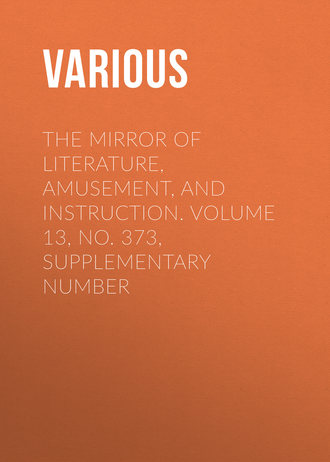 полная версия
полная версияThe Mirror of Literature, Amusement, and Instruction. Volume 13, No. 373, Supplementary Number
I was with Lord Byron, at his house in Piccadilly, the best part of the three last days before he left London, to quit England; I expressed my regret at his departure, and desired to know if it was really his intention not to return (little anticipating what eventually took place;) he fixed his eyes upon me with an eager look of inquiry, exclaiming at the same time, "Good God! I never had it in contemplation to remain in exile—why do you ask that question?" I stated that such a report had been rumoured. "I certainly intend returning," continued his lordship, "unless the grim tyrant should be playing his pranks on me."
He appeared very anxious for the voyage, and walked about the room in great agitation, waiting the return of a messenger who had been sent respecting some delay which was likely to take place; the messenger however soon entered, and presented him a letter, which his lordship opened with great eagerness. In reading the letter his countenance, like the earth illumined by the re-appearance of the moon, after having been obscured by dark clouds, brightened up, and at the close he exultingly exclaimed "this is kind—very kind—Nathan! to-morrow I quit." I soon after left him; he shook me heartily by the hand, and left with his impression a fifty pound note, saying, "Do not be offended with me at this mode of expressing the delight you have afforded me—until we meet again, farewell!—I shall not forget my promise." His lordship here alluded to some promised verses.
Having left the room he called me back, and reverting once more to my first allusion of the rumour about his not returning, laughingly said, "Remember, Nathan, you shall certainly see me again in body or in spirit."
There are several other interesting anecdotical Recollections of Lord Byron, especially of his connexion with Drury Lane Theatre, and above all, a new light is thrown on his Lordship's affair with Mrs. Mardyn. Appended are likewise some characteristic traits of the late Lady Caroline Lamb, with some pleasing specimens of her Ladyship's poetical talent. Altogether, Mr. Nathan's is just the book for the season; and we have penciled a few of its pleasantries for our next number.
THE RUSSIAN NAVY
One of the most striking and gigantic buildings in St. Petersburg is the Admiralty. The principal front on the land side is considerably more than one-third of an English mile in length, and its wings, in depth, extend six hundred and seventy two feet, down to the edge of the Neva, this noble river forming the fourth side of the quadrangle. Within the three sides (the Neva and two wings) are ranges of parallel buildings, which form the magazines, artificers' shops, mast and boat houses, offices, &c.; and in the area within these are four slips for building the largest, and two for a smaller class of ships of war. The whole of the outer range of buildings consists of grand suites of rooms, and long and beautifully ornamented galleries, filled with the natural history and curiosities collected in every part of the globe, and brought by the different navigators which Russia, of late years, has sent forth on discovery. In one room are assembled all the different nautical and mathematical instruments; in another all the models of ships of different nations and different eras; in another a complete library connected with every branch of the marine service.—Granville's Travels.
1
The word Wehme, pronounced Vehme, is of uncertain derivation, but was always used to intimate this inquisitorial and secret Court. The members were termed Wissenden, or Initiated, answering to the modern phrase of Illuminati.
2
Baaren-hauter,—be of the Bear's hide,—a nickname for a German private soldier.









